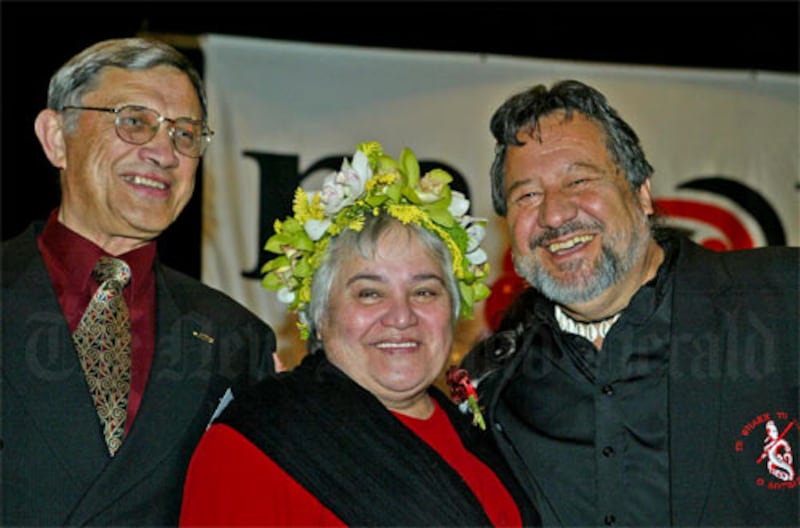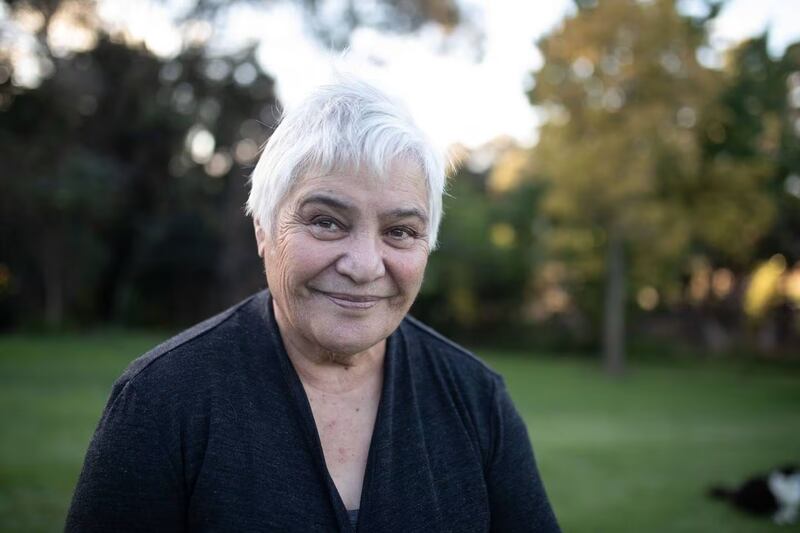Kahurangi (Dame) Tariana Turia, the founding member of Te Pāti Māori, has died at the age of 80 in Whangaehu overnight.
The former government minister, of Ngāti Apa, Ngā Wairiki, Ngā Rauru, Tūwharetoa, and Whanganui descent, suffered a stroke earlier this week, and was not given long to live.
Born in 1944 in Ngāruawāhia, Dame Tariana embraced her whakapapa from a young age and became a formidable advocate for Māori rights. Her enduring legacy reflects her steadfast commitment to the well-being of her people and her tireless efforts to address systemic inequities.
Of her achievements, Dame Tariana often said her greatest was her marriage of 56 years to George Turia, who died in April 2019, as well as her six children, and more than 80 mokopuna.
In 1993, Dame Tariana established Te Oranganui Iwi Health Authority in Whanganui, the first iwi-led public health organisation.
She caught the public eye in 1995 as a leader of the Pākaitore (Moutoa Gardens) occupation in Whanganui city as a way to restore the mana of the Whanganui people, leading to an agreement which sees iwi co-manage the area with local and national government.
Dame Tariana’s political career
Beginning her political career as a Labour MP in 1996, Turia’s legacy is shaped by her defiance of the party’s foreshore and seabed policy in 2004, which led her to resign from Parliament, break away from Labour, and form Te Pāti Māori.
Following her win in the subsequent by-election in Te Tai Hauāuru, she became the first MP to be sworn in with an affirmation in te reo Māori.

She co-led the party with Pita Sharples, becoming a beacon for Māori representation and autonomy.
Under Turia’s leadership, the party climbed from strength to strength, winning four Māori electorates in the 2005 election, and five in the 2008 election.
Through coalition agreements, Dame Tariana championed transformative initiatives, including a review of the Foreshore and Seabed Act 2004 that prompted her split with Labour, ultimately leading to its repeal and replacement with the Takutai Moana (Marine and Coastal Area) Act 2011.
Turia was the first minister for Whānau Ora, a holistic framework for improving Māori well-being, which remains one of the most innovative approaches to social services in Aotearoa New Zealand. Its emphasis on empowering whānau to determine their own futures epitomised Dame Tariana’s philosophy of self-determination.
In her words, “the decisions must be made by the family, re-empowering the family to take back control over their own situation and to determine the solutions that impact them. What we’re trying to do is to bring to fruition the aspirations of our people to take back responsibility and obligation”.
Dame Tariana was a key driving force behind the comprehensive campaign to reduce tobacco consumption through legislation, removal of tobacco displays, plain packaging, smoking cessation, and tobacco taxation.
In recognition of her mahi, the American Cancer Society awarded her the Luther Terry Award for Exemplary Leadership in Tobacco Control in 2015.
In 2010, Dame Tariana became the first recipient of ‘Tū Rangatira mō te Ora’ to recognise leadership in Maori health.
She is the first Māori woman to receive the Blake Medal, the highest leadership award of the Sir Peter Blake Trust.

Her political career spanned several more ministerial portfolios, replacing Paula Bennett as Minister for Disability Issues and serving as Minister for the Community and Voluntary Sector, as well as Associate Minister of Health, and Social Development and Employment in the Fifth National Government from 2008 to 2014.
Under the Fifth Labour Government (1999 – 2008), she served as Associate Minister of Māori Affairs, Social Services and Employment, Health, Housing, Corrections, and Minister for the Community and Voluntary Sector.
Dame Tariana’s achievements were recognised in 2015 when she was appointed a Dame Companion of the New Zealand Order of Merit for her services to Māori and the wider community.
Despite retiring from politics in 2014, she remained a guiding presence, mentoring emerging leaders and continuing to advocate for tino rangatiratanga.
Life after politics
Post-politics, she was appointed to the Whanganui District Health Board and Te Kōhanga Reo National Trust Board.
She is an Honorary Fellow of the New Zealand College of General Practitioners, a life member of CCS Disability Action, and a Mentor for ABI Rehabilitation.
Dame Tariana was the Chair /Trustee of the National Hauora Coalition Trust from 2015 until November 2022, and her mahi was honoured in July 2021 with the opening of Te Turangawaewae Manahau a Tariana Turia – The Tariana Turia Centre for Excellence.
In November 2017 Dame Tariana was appointed Te Pou Tupua; to be the human face and act in the name of Te Awa Tupua; a role her whānau said “she described as the most important role in her life”.
In 2023 Dame Tariana was awarded an Honorary Doctorate from Te Whare Wananga o Awanuiarangi, and inducted into Te Whare Pūkenga, an award established by the National Iwi Chairs’ forum to recognise rangatira who have enhanced the lives of all whānau in Aotearoa.
Sir Mason Durie ONZ KNZM describes her leadership legacy.
“Her down-to-earth approach, coupled with her extraordinary ability to relate to all sections of society in ways that are frank and at the same time inspiring, have provided a style of leadership that can serve as a model for future generations.”
He toa whawhai mō tōna iwi.
Former Te Pāti Māori president Che Wilson paid tribute to Turia, for her decades of service to te iwi Māori.
“E kino ana te pouri o te ngākau i te rironga atu o tēnei whāene, o Tariana ki te iwi nui.”
“Heoi anō, I whai wā te whānau me te iwi ki te noho tahi ki a ia. I whakahokia ia ki tōna marae takoto tūroro ai, he ataahua te noho ki tōna marae, tōna whare o Rangitāhuahua i ngā rangi nei kua pahure.”
“Te whakaatu atu te pehea te tu rangatira te tu motuhake. I timata a ia i roto i ngā tau ki te whakaora i tōna ake marae, nānā anō tōna marae i whakatū.“”
E te māreikura, haere atu rā, haere atu rā, haere atu rā. Haere atu rā ki te pūtahitanga o Rehua, ki te huinga o te kahurangi.



